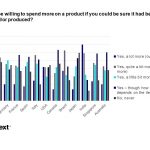Industry Talk
Regular Industry Development Updates, Opinions and Talking Points relating to Manufacturing, the Supply Chain and Logistics.Transforming Supply Chain Agility with Vessel Tracking

Customer delivery expectations are rising, with timescales being a big purchase decision driver, retailers are often found competing over providing the quickest, most efficient delivery service. With this in mind, retailers need to make sure that their transport methods are agile and continuously controlled in order to avoid delays and customer dissatisfaction, but how can this be achieved?
In a world of real time supply chain management, the lack of proactive approaches to timely decision making when it comes to transporting goods is startling, particularly when it comes to sea freight cargo. GPS vessel tracking has long provided a retailer with visibility of stock in transit, from the moment it is loaded on to a vessel to movement between carriers and final unloading. But, as Rowena Buntrock, Solutions Director, Adjuno, explains, it is the way in which this information can be embedded within operations, both reactively and proactively, that will transform efficiency, effectiveness and customer engagement.
Hidden Risk
In an eCommerce dominated world predicated on high levels of stock accuracy and transparency of delivery, unexpected delays at any stage of the supply chain can have a massive – and expensive – knock on effect. From hurricanes in the Atlantic to political unrest in the far east or strikes in Europe, the impact of products being stuck on a vessel for even a few additional days can be very significant.
For retailers, the problem is not simply the risk of reneging on customer promises; it is the sheer lack of visibility which fundamentally constrains effective decision making. Where is the stock? How long is the delay likely to last? Should substitute stock be allocated to stores or Distribution Centres or is it worth fast tracking a replenishment order via air, rather than sea, to avoid a shortfall?
There are a myriad of options for mitigating the potential problems created by vessel delays – but the question is: just how big is the problem? And for the majority of retailers, once the goods are on board a ship, planning teams simply do not have access to the information required to make well-informed, meaningful decisions.
End to End Visibility
But this is changing. Not only can real time GPS vessel tracking provide constant, accurate visual progress of goods in transit, this information can be combined with additional data feeds – such as weather and news, even port congestion or tide times – to gain essential insight into potential delays. Add in the intelligence delivered by machine learning and retailers can use this real-time GPS tracking to understand the supply chain fall out of a potential delay, insight that can support intelligent decision making regarding the most effective response.
Feeding this immediacy and accuracy of vessel tracking into the supply chain management solution will enable retailers to rapidly understand the options should a delay be predicted – from diverting products to different hubs or warehouses, to expediting delivery once goods are discharged from the vessel, allocating a substitute product or opting for rapid replenishment via air to avoid an expensive shortfall.
Furthermore, with a constant assessment of the impact on cost and product availability of specific decisions, machine learning can fine tune recommendations leading to ever faster and more effective responses to vessel delay.
Mitigating Uncertainty
A few days delay can have far reaching ramifications on the rest of the supply chain – from the build up of vessels attempting to reach port after a storm to congestion within the warehouse. The result is not only additional cost but also the risk of missed customer promises and uncontrolled costs. Every decision is reactive, because retailers have no trusted insight into either vessels’ position or the potential implication on the next stage of the supply chain. Add in the uncertainty spike likely to hit as a result of Brexit – from new customs challenges onwards – and this lack of insight is creating ever greater risk.
In contrast, a retailer presented with an 80% certainty of a five day delay, plus a range of viable alternatives based on previous decisions and their business impact, can be both confident and proactive in response. Additionally, while businesses need to understand the impact of any resolution they may choose, it’s also important to understand whether the original five day delay even matters. For some scenarios delays it’s acceptable not to take any action, for example if products haven’t been widely advertised as launching on a specific date or if no orders have been promised to be fulfilled by that certain time, then there’s little to no consequences that can come from a short delay. When action does need to be taken however, having a transparent and agile supply chain is vital. From allocating the right resources to the warehouse at the right time, to offering customers alternative products, to understanding the implications of delays, embedding GPS vessel tracking into both day to day decisions and strategic planning can transform retailer confidence in an increasingly uncertain marketplace.










